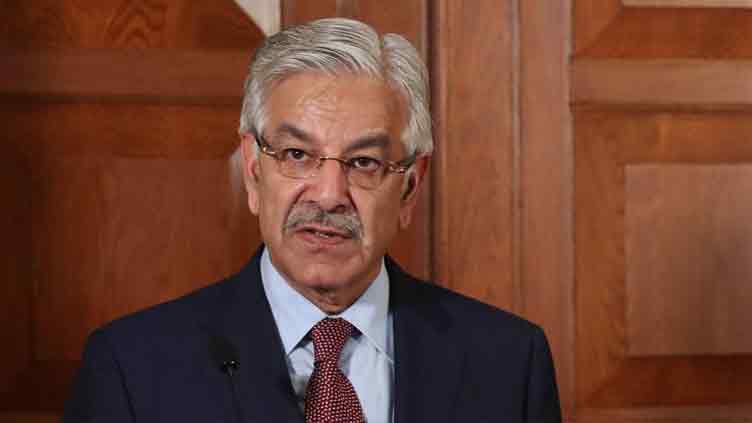Defence Minister Khawaja Asif has said that Pakistan shared good relations with the interim government in Afghanistan, but at the same time expressed concern that the “TTP [Tehreek-i-Taliban Pakistan] is using Afghan soil even today for attacks in our country, especially Khyber Pakhtunkhwa”.
Pakistan has witnessed a surge in TTP violence since peace talks between the militant group and the government began to falter in the latter half of last year. The TTP formally ended the ceasefire on November 28 and since then executed more than 100 attacks. Many of these attacks were planned and directed by the TTP leadership based in Afghanistan.
During the interview on Tuesday, Asif recalled that the issue of increased attacks by the TTP was brought to the notice [of the Afghan Taliban rulers] during his recent visit to Kabul.
Earlier this year, a Pakistani delegation — comprising Asif, Inter-Services Intelligence (ISI) Director General Lt Gen Nadeem Anjum, Foreign Secretary Asad Majeed Khan, Chargé d’Affaires (CdA) to Afghanistan Ubaidur Rehman Nizamani and Pakistan’s Special Representative for Afghanistan Mohammad Sadiq — visited the Afghan capital for talks on security-related matters, including counter-terrorism measures.
Talking to VOA, the minister said: “[In the meeting] The [Afghan] Taliban had expressed their determination to deal with this problem and said that they won’t allow their land to be used for terrorism as per the Doha Agreement.”
Asif said the Afghan Taliban and TTP shared a “camaraderie” because they have been fighting against Nato together for the past 20 years.
“According to my information on TTP militants, between 7,000 to 8,000 of them have been involved in the war against Nato with the Afghan Taliban.
“In this context, there is a camaraderie between the Afghan and Pakistani Taliban which was also seen in their [Afghan Taliban’s] words during our meetings that they are not in a position to oppose them [TTP] but they also want to help Pakistan,” he said.
At one point during the interview, Asif said that the TTP was equipped with advanced weapons such as night vision goggles that were left behind by the American forces when they exited Afghanistan.
“They are also getting such devices from other countries,” he claimed. “Those who do not have good relations with Pakistan, like India, to name a few, have provided help in the past through their consulates inside Afghanistan … we have also provided evidence to the international community [on this] … now they are helping the Taliban.”
Talking about the recent protests in KP against rising militancy, the minister said that the people of the province were not ready to “co-exist” with the TTP.
“It is remarkable that people are protesting unarmed against the return of the Taliban [in Pakistan]. These people have been poisoned by the Taliban in the past as well. Look at the leadership of PTM [Pashtun Tahaffuz Movement], their relatives were killed by TTP.
“What is encouraging is that people protested of their own will. They did not protest in the past. They have realised that they don’t want to live with the TTP, considering the peaceful life they have lived in the last eight to 10 years,” Asif added.
He also admitted that due to the political situation in Pakistan, protests against militancy in several areas of Pakistan were often overlooked by the media.
In response to a question, the minister said that there was no difference between the TTP and the Afghan Taliban. “But according to our talks with the Afghan Taliban … it seems that they want to distance themselves from the TTP,” he pointed out, adding that the Afghan Taliban were “politically astute” people.
Asif’s remarks come days after the National Security Committee (NSC) — the principal decision-making body on national security matters — agreed to launch an “all-out comprehensive operation” to rid the country of the menace of terrorism.
“The meeting agreed to launch an all-out comprehensive operation with [the participation of] entire nation and government to rid the country of the menace of terrorism with renewed vigour and determination,” the press release issued by the Prime Minister’s Office after the meeting had said.
It had added that the operation to eliminate the scourge of terrorism in all its forms from Pakistan would incorporate measures at political, diplomatic security, economic and social levels.

